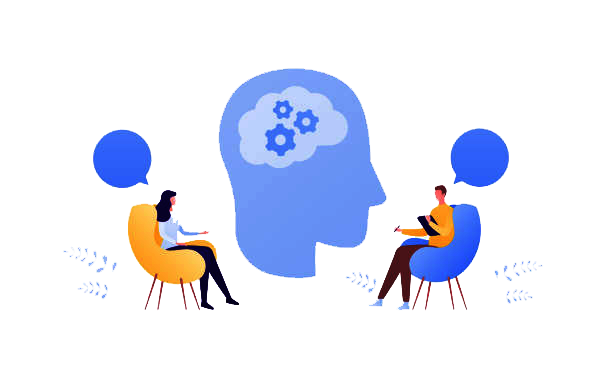Counselling for Anxiety
Anxiety is a common emotion we face on a regular basis. We all experience anxiety while giving an examination, visiting the doctor or before any kind stage performance. However, when an individual faces anxiety at inappropriate levels regularly, it can be categorized as an anxiety disorder. Anxiety is a diffuse, vague, unpleasant feeling of fear and apprehension, for dealing with such anxiety, a person must take anxiety counselling.

01
Facts To Know
- Anxiety disorders are treatable and yet only one-third of those suffering receive treatment.
- Anxiety disorders are often accompanied by co-occurring disorders.
- Anxiety can cause a wide range of physical symptoms.
- Women are more likely than men who have anxiety disorders
- There are more than one anxiety disorder out there disorders
- There’s more than one anxiety disorder out there.
02
What Causes Anxiety?
- Witnessing a traumatic experience or exposure, such as accidents or unpleasant circumstances.
- Giving up after prolonged drug or alcohol induces higher level of anxiety.
- Changes in brain chemistry due to medical factors, age, biological changes can lead to anxiety.
- Future worries like money, protection, health, loneliness etc. can lead to anxiety.
03
Treatment
- Psychotherapy- This way of treatment is done through talk therapy.
- Cognitive Behavioural Therapy- CBT is a practical treatment, which involves teaching practical skills to deal with anxiety symptoms
- Medication – Antidepressants are used to treat anxiety disorders.
- Relaxation techniques are one of the best ways to deal with anxiety, one of them is progressive muscle relaxation.
Recommended Programs For Anxiety
Opaquer offers tech-enabled online wellness programs that will serve as a one stop solution for all your online counselling requirements.




PHYSICAL SYMPTOMS
PSYCHOLOGICAL SYMPTOMS
- Excessive fear or worry
- Repetitive thoughts
- Intrusive thoughts about self and others
- Lack of focus/ concentration
- Forgetting
- Difficulty in keeping things in mind
- Feelings of hopelessness
- Low energy
- Disturbed lifestyle
- Lack of emotional stability
PHYSICAL SYMPTOMS
- Loss of voice
- Difficulty in doing or following a conversation
- Shyness
- Passivity
- Find difficult to express to people
- Avoiding social situations
- Feelings of messed up
- Difficulty in handling things/work
- Lashing out
- Find difficult to adjust to new/ unfamiliar situations
- Limiting your activities
Causes Of Anxiety
People tend to stress about anything and everything in life. They don’t seem to have specific cause for their worry it can be anything, which gradually starts affecting their physical and emotional health tremendously.
- Traumatic experience or exposure
Tragic experience or exposure often imprints us with unpleasant and fearful memories which does not allow us to think rationally or practically. For example witnessing an accident, exposure to unpleasant sight, abuse.
- Future uncertainty or negative anticipation
Excessive and stressing in a negative way about future like finance, security, stability, loneliness etc. may lead to anxiety.
- Childhood trauma
Childhood trauma has a significant impact in the overall shaping of cognitive and emotional makeup of a person, which later on become a major cause of mental health concerns and worries in adulthood.
- Disturbed Sleeping and Eating Habits
Unhealthy sleeping and eating routine may make you prone towards the anxiety over a period of time.
- Medical or medicine induced Anxiety
Chronic illness or serious health condition may lead to excessive worry in terms of finances, health risk, long term medical dependency, side-effects of medicines.
- Work stress
Work life has become one of the major stress creating aspect of everyone’s life, it not only affects the working person but their family due to unavailability, lack of quality time. Prolonged work hours, demanding job, pressure and exhaustion can take an adverse toll on their life.
- Bullying and Harassment
Bullying is prevalent in various organization be it school, college or workplace in different forms. Taking undue advantage, taking employees for granted, constant demotivation and negativity, inter and intra politics becomes a reason for bullying and abuse in various forms. This may result in anxious and restless tendencies in employees.
How can 2wellbeing online counselling and therapy can help and benefit you to deal and heal your anxiety attacks and anxiety disorders?
You have the power to make choices, but having anxiety is not one of them. Anxiety just happens. It’s not a choice. Nobody chooses to be anxious or afraid. But you certainly can choose a new approach to your anxiety to get a different outcome in your life.
- Learn to act differently on your anxiety and your life by putting you in control of what you can control. Put simply, you can control and change how you respond to your anxiety-related feelings, thoughts, and worries:
- Stop trying to cope with worries, anxieties, and fears (if coping and other management strategies have not worked in a lasting way).
- This is an opportunity for you to become capable of facing the situations by redirecting your emotions in the right direction.
- We understand your situation and provide unconditional support and guidance to help you in your journey.
- Wide range of activities have been designed to help you understand the cause of the situation and acquire skills to conquer it.
- Learn to leave worries, anxieties, and fears alone and simply experience them as thoughts, sensations, feelings, or painful memories. You don’t have to act on your anxiety, and it doesn’t need to drive what you do. As much as you feel like running from intense anxiety, you can learn to act differently.
- Learn to watch anxious feelings and worrisome thoughts and not do what they tell you to do.
- Learn to nurture a kinder and friendlier relationship with yourself and your emotional life instead of reacting to anxiety as an enemy or unwelcome guest.
- Learn to move with your anxious discomfort and do something that’s potentially vital in your life.
- In this journey, we help you become capable of becoming the best version of yourself.
Possible Treatments and Therapy to Heal Your Anxiety:
- Learning Progressive relaxation
- Guided imagery
- Self-hypnosis and deep-breathing exercises
- Mindfulness & Meditations
- Dialectical Behavioral Therapy
- Exposure therapy
- Cognitive Behavioral Therapy
- Self-awareness activities
- Acceptance and Commitment Therapy
Try to get the most out of your online counselling & therapy. Keep your appointments. Practice the exercises your therapist gives you. Treatment helps, and without it, you might get worse. Remember, you don’t have to deal with Anxiety attacks & disorders on your own. Help is out there.
Begin Your Journey With An Experienced Therapist and Heal Your Anxiety





